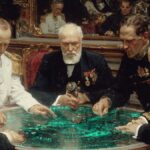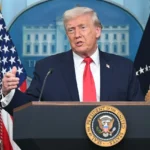Table of Contents
As the geopolitical landscape continues to evolve, understanding American public opinion on foreign affairs is crucial for both policymakers and global leaders. A new Pew Research Center survey, conducted from March 24 to March 30, 2025, sheds light on how Americans perceive the United States’ global role, particularly in the areas of foreign aid, international threats, and the country’s standing in the world. This survey, which follows a series of significant U.S. foreign policy shifts under the Trump administration, provides an insightful look into the public’s stance on global engagement, with particular attention paid to partisan divides and shifting perceptions of global power dynamics.

1. Strong Bipartisan Support for Humanitarian Aid
The survey finds that the American public is overwhelmingly in favor of providing humanitarian aid to developing countries. Specifically, around 80% of Americans support sending medicine, medical supplies, food, and clothing to people in need around the world. These types of aid are seen as crucial in alleviating the suffering of those in low-income or disaster-stricken regions.
Interestingly, military aid and funding for foreign cultural and arts programs receive significantly less support, with fewer than 40% of Americans endorsing these forms of aid. This suggests that while Americans support efforts that provide immediate relief to vulnerable populations, there is less enthusiasm for aid that may be perceived as strategically motivated or indirectly linked to U.S. interests.
While Democrats and Democratic-leaning Independents are more supportive of all types of foreign aid, Republicans also show strong support for basic humanitarian assistance, especially medicine, medical supplies, and food. Over 60% of Republicans agree that the U.S. should provide aid to developing nations, with support for economic development and democracy strengthening programs reaching more than 40% of Republicans. However, Republicans tend to oppose military and cultural aid more than Democrats, highlighting a partisan divide in perceptions of what constitutes necessary international assistance.
2. Partisan Divides in Views on U.S. Global Engagement
One of the most notable findings in the 2025 survey is the sharp partisan divide on the issue of global engagement. When asked whether the U.S. should focus more on domestic issues or engage more actively in world affairs, 62% of Democrats responded that the U.S. should maintain an active role in global affairs, while 67% of Republicans preferred to concentrate on problems within the country.
This divergence reflects broader differences in ideological perspectives. Democrats tend to favor international cooperation, emphasizing the importance of global leadership, while Republicans tend to advocate for a more insular approach, prioritizing U.S. interests over international collaboration. This difference is particularly significant in the context of foreign aid, where Democrats are generally more supportive of foreign economic development and democratization efforts, while Republicans express more skepticism toward such long-term aid programs.
Additionally, 64% of Americans believe that the U.S. should take into account the interests of other countries in major international issues, even if it means making compromises. This view is strongly endorsed by Democrats (83%), but Republicans are more divided, with 52% prioritizing U.S. interests even when it conflicts with those of other countries, while 47% agree that the U.S. should consider the interests of others.

3. Shifting Perceptions of Global Threats: China vs. Russia
The survey reveals a significant shift in how Americans perceive global threats, particularly in relation to China and Russia. Historically, China has been viewed as the largest threat to the United States, but in 2025, the findings show that Republicans and Democrats are diverging on this issue. 42% of Americans now view China as the greatest threat, but a growing number of Democrats—**39%—now see Russia as the primary concern, compared to just 28% who view China as the biggest threat.
This change in threat perception has important implications for U.S. foreign policy. While Republicans continue to view China as the top threat, Democrats are shifting their focus to Russia, especially in light of recent events involving Russian aggression and interference in global affairs. These contrasting views further underscore the partisan polarization in U.S. foreign policy, with Republicans maintaining a focus on China due to economic and military concerns, while Democrats are increasingly concerned with Russia’s role in global security issues, particularly in Europe.

4. Support for U.S. Allies: The G7 and Beyond
In terms of the U.S.’s most important allies, members of the G7— Japan, Canada, the United Kingdom, Germany, France, and Italy—continue to receive overwhelmingly positive ratings. Over 60% of Americans rate these countries favorably, reflecting a strong sense of unity among Western democracies. Republicans and Democrats alike view these countries positively, although Republicans are more likely to see Israel in a positive light compared to Democrats, who rate Israel much lower.
In contrast, countries like China, Russia, and Iran receive negative ratings, with 21%, 13%, and 10%, respectively, holding favorable views of these nations. China and Russia‘s low favorability ratings highlight the growing tensions between these countries and the U.S., exacerbated by ongoing trade wars, military developments, and geopolitical conflicts.
5. U.S. Global Influence: Declining Power or Necessary Retreat?
One of the most striking findings of the survey is the public perception that the U.S. is losing global influence. Roughly 52% of Americans believe the U.S. is losing its influence in the world, with 67% of Democrats agreeing, compared to 37% of Republicans. This marks a reversal from previous years, where Republicans were more likely to express concern about the decline of U.S. power.
However, while Americans feel the U.S. influence is weakening, the country is still seen as the leading military power, with 76% of respondents affirming the U.S.’s global military dominance. On the other hand, when it comes to economic power, 48% say the U.S. remains the top economic force, but 38% now believe China is the world’s leading economy. This marks a significant shift in economic perceptions, as China’s rapid growth has positioned it as a formidable global economic power.

6. U.S. Respect on the Global Stage
91% of Americans believe it is important that the U.S. is respected around the world, with 57% considering this “very important.” Despite these sentiments, however, only 56% of Americans feel that the U.S. is currently respected globally. Republicans (72%) are more likely to believe in the U.S.’s global respect than Democrats (39%), reflecting the ongoing debate on American leadership and its standing in the world.
7. The U.S. and its Allies in 2025: Who is the Most Important?
When asked about the most important ally to the U.S., 18% of Americans named the United Kingdom, followed by Canada (12%) and Israel (9%). However, 37% of Americans expressed uncertainty about the most important ally, which points to limited public awareness of the dynamics of global alliances.

Conclusion: Navigating U.S. Foreign Policy in 2025
The Pew Research Center’s 2025 survey highlights the complex and evolving landscape of U.S. foreign policy. It reveals a bipartisan consensus on humanitarian aid and a growing division in perceptions of international engagement and global threats. The shift in threat perceptions, particularly regarding China and Russia, further underscores the need for strategic recalibration in U.S. foreign policy. With rising concerns over declining influence, policymakers must find ways to address both domestic concerns and international responsibilities.
As the 2026 elections draw near, public opinion will continue to play a crucial role in shaping the U.S.’s approach to global leadership. Understanding these perspectives will be essential for crafting policies that balance national interests with global cooperation and leadership.
Author Profile
- Syed Tahir Abbas is a Master's student at Southwest University, Chongqing, specializing in international relations and sustainable development. His research focuses on U.S.-China diplomacy, global geopolitics, and the role of education in shaping international policies. Syed has contributed to academic discussions on political dynamics, economic growth, and sustainable energy, aiming to offer fresh insights into global affairs.
Latest entries
 U.S. Foreign PolicyFebruary 2, 2026AI and Grand Strategy: The Case for Restraint – Navigating the Future of American Power
U.S. Foreign PolicyFebruary 2, 2026AI and Grand Strategy: The Case for Restraint – Navigating the Future of American Power National SecurityJanuary 31, 2026Treating China’s Connected Energy Systems as a National Security Risk
National SecurityJanuary 31, 2026Treating China’s Connected Energy Systems as a National Security Risk Global HealthJanuary 29, 2026The Future of the WHO—and How the United States Can Shape It
Global HealthJanuary 29, 2026The Future of the WHO—and How the United States Can Shape It Global TradeJanuary 22, 2026Trump Cancels Tariffs on European Nations Over Greenland Pursuit?
Global TradeJanuary 22, 2026Trump Cancels Tariffs on European Nations Over Greenland Pursuit?



4 comments
Your story touched my heart. I can completely relate to this topic , and it’s so refreshing to read something so honest and vulnerable. Your perspective has given me a new way to think about the topic. Thank you for sharing! please
This was such a fantastic read! I love how you broke down —it really made me think differently about this topic Your writing style is so relatable and easy to follow. Can’t wait to see what you share next! 👏
Syed Tahir Abbas’s work in international relations and sustainable development is truly inspiring. His focus on U.S.-China diplomacy and global geopolitics highlights the importance of understanding complex international dynamics. The emphasis on education’s role in shaping policies is particularly thought-provoking. It’s refreshing to see someone tackling such critical issues with such depth and clarity. I wonder how his research could be applied to current global challenges. Do you think his insights could influence policymakers in a meaningful way? I’d love to hear more about his specific findings and how they could impact the future of international relations. What are your thoughts on the role of education in global policy-making?
Hi! I know this is somewhat off topic but I was wondering if
you knew where I could locate a captcha plugin for my comment form?
I’m using the same blog platform as yours and I’m
having problems finding one? Thanks a lot!